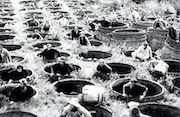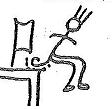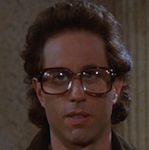|
SuperMechagodzilla posted:How is racism (and sexism, etc.) not about class? Because women and most non-white races are genetically inferior, regardless of class.
|
|
|
|

|
| # ? May 2, 2024 15:55 |
|
The Warszawa posted:Because those oppressions operate independently of class - and across classes. They may have economic consequences, and racism of course interacts with and impedes class solidarity, but reducing it to "it's just a mask for class" either overbroadens class (which I don't think you're doing) or grossly misunderstands how racism (and sexism etc.) actually operate. My approach does not presume equivalence, and I think you have it flipped in saying that racism has economic consequences. Racism began as a justification for slavery and has been used as an essentialist explanation/justification for social hierarchies since. Racism does affect people in pretty much any income bracket, but when I talk about class I am not referring simply to income.
|
|
|
|
Film sucks. My terrorist isn't brown enough.
|
|
|
|
The Warszawa posted:Because those oppressions operate independently of class - and across classes. They may have economic consequences, and racism of course interacts with and impedes class solidarity, but reducing it to "it's just a mask for class" either overbroadens class (which I don't think you're doing) or grossly misunderstands how racism (and sexism etc.) actually operate. If there is some Guinness award for living in the largest blind spot, Tim Wise would be up there for contenders. His article just drips with irony, asserting in a completely reductive understanding of class and race relations as critiqued by Marxists that it is they, the (white) left that lack nuance: Keeanga-Yamahtta Taylor posted:Here, Wise accuses Marxism of: "extreme class reductionism," meaning that Marxists allegedly think that class is more important than race; reducing struggles against racism to "mere identity politics"; and requiring that struggles against racism should "take a back seat" to struggles over economic issues. Wise also accuses so-called "left activists" of reinforcing "white denial" and "dismiss[ing] the lived reality of people of color"--which, of course, presumes Left activists and Marxists to all be white.
|
|
|
|
Danger posted:If there is some Guinness award for living in the largest blind spot, Tim Wise would be up there for contenders. His article just drips with irony, asserting in a completely reductive understanding of class and race relations as critiqued by Marxists that it is they, the (white) left that lack nuance: Yeah, but it was on hand and this isn't the "systemic racism is not solely a problem of capitalism, or, at the very least, racism is a problem that even your preferred outcome will have to deal with directly" thread. I've recommended books on the topic of systemic racism in this thread, they go further into the problem (look for the big post replying to 7thBatallion). Marxism has had oodles of trouble running up against identity (race, gender, and sexuality) critiques (like feminism) because it insists on treating these oppressions as "subsets" of capitalism instead of problems in their own right, with targeted solutions. This is important not only in the "once Marxists achieve their goals, we're hosed if it just so happens that racism, sexism, etc. persist because we've thrown all our weight behind this problem" but in the real sense of ensuring that we're getting something for the reality, which is that we're the first to get harmed - economically or physically - in any struggle against institutional power. SuperMechagodzilla posted:My approach does not presume equivalence, and I think you have it flipped in saying that racism has economic consequences. Racism began as a justification for slavery and has been used as an essentialist explanation/justification for social hierarchies since. It's been a while since I studied Marxist theory (and when I did, I clearly focused on orthodox Marxism, so I don't expect I'm perfectly representing either you or Danger here), but I don't think its particularly equipped to deal with racial struggle alongside class struggle - and in fact often rejects (as you seem to) that racial justice is actually a thing in its own right, as opposed to either something that, insofar as it's worth solving, will be solved by class justice or, less generously, a distraction from "real issues." Obviously class is not simply income (nor did I ever say it was), but racism is not purely economic, unless you're arguing that how someone relates to the means of production, etc., is trumped by racial subjugation for class purposes, which is interesting and more in line with what I think, but certainly isn't orthodox. The point is that by shunting race, gender, etc. to the side and - in your words - putting the emphasis on class, you're delineating them as separate and prioritizing one over the other, which leaves people of color twisting in the wind when what is needed is direct confrontation of racism itself, not just white confrontation of liberal ideology in a white context (which is what we have here). This is the kicker: even if racism is just one manifestation of class, it is a manifestation that must be tackled directly and independently of "traditional" class struggle, and asking people of color to line up behind the latter while dismissing the former (by discarding color - both metatextually, as you've articulated as a "more effective and efficient way" of dealing with class, and literally, by excluding them from the process of the critique) is unconscionable. The Warszawa fucked around with this message at 18:25 on Jun 13, 2013 |
|
|
|
The Warszawa posted:It's been a while since I studied Marxist theory (and when I did, I clearly focused on orthodox Marxism, so I don't expect I'm perfectly representing either you or Danger here), but I don't think its particularly equipped to deal with racial struggle alongside class struggle - and in fact often rejects (as you seem to) that racial justice is actually a thing in its own right, as opposed to either something that, insofar as it's worth solving, will be solved by class justice or, less generously, a distraction from "real issues." Obviously class is not simply income (nor did I ever say it was), but racism is not purely economic, unless you're arguing that how someone relates to the means of production, etc., is trumped by racial subjugation for class purposes, which is interesting and more in line with what I think, but certainly isn't orthodox. The point is that by shunting race, gender, etc. to the side and - in your words - putting the emphasis on class, you're delineating them as separate and prioritizing one over the other, which leaves people of color twisting in the wind when what is needed is direct confrontation of racism itself, not just white confrontation of liberal ideology in a white context (which is what we have here). This is the kicker: even if racism is just one manifestation of class, it is a manifestation that must be tackled directly and independently of "traditional" class struggle, and asking people of color to line up behind the latter while dismissing the former (by discarding color - both metatextually, as you've articulated as a "more effective and efficient way" of dealing with class, and literally, by excluding them from the process of the critique) is unconscionable. I think there's some confusion here, because Danger's and my position is not exclusionary but inclusionary. Although we're critical of Tim Wise and multiculturalism and whatnot, we are not putting antiracism to the side to focus on something else - and it's certainly not 'discarding color.' Rather, we're going right to the root cause of racism, and promoting solidarity along class lines as a specifically antiracist tactic. The film we're talking about doesn't even 'discard color', since it links the treatment of Khan to how Starfleet treats other races and how Kirk treats women. The film opens with colonialist imagery that the film then returns to in a critical way. The science fiction is that film begins with the magical premise of a 'postracial' utopia where multiculturalism had been fully embraced - and then addresses the racism and other inequalities that persist because of flaws in that ideology.
|
|
|
|
SuperMechagodzilla posted:I think there's some confusion here, because Danger's and my position is not exclusionary but inclusionary. Although we're critical of Tim Wise and multiculturalism and whatnot, we are not putting antiracism to the side to focus on something else - and it's certainly not 'discarding color.' Rather, we're going right to the root cause of racism, and promoting solidarity along class lines as a specifically antiracist tactic. But through whitewashing, the development and construction of these critiques takes our cause and excludes us (people of color) from a critique that purportedly represents our own needs and interests. It's seems that your position is only inclusionary in the superficial sense - we're included, so long as we don't expect to actually have a voice. I'm not sure what your working definition of multiculturalism is here, but it seems to me that in your anti-multiculturalist perspective, we are to become, to paraphrase you, just more nonwhite baristas in Critbucks. Our role is Sulu's - to sit by until we're needed to carry out the orders of the white leadership (either the leadership of extant institutions being critiqued or those doing the critiquing) or possibly Uhura's - to lend credence to the prioritization of the white take on our liberation by "speaking the language." Basically, an all-white dialogue about the "root cause of racism" (regardless of the conclusion, and my disagreement with you as to the validity of that is a matter for another thread) is part of the problem, not the solution, just as would be the development of antiracist critiques in an all-white country club, or leaving the development of class critique exclusively in the hands of the capital class - simply put, even if they come to the "right" conclusion, the enforced narratives of who gets to have a say entrench persistent problems rather than mobilize against them. quote:The film we're talking about doesn't even 'discard color', since it links the treatment of Khan to how Starfleet treats other races and how Kirk treats women. The film opens with colonialist imagery that the film then returns to in a critical way. Perhaps I've misunderstood your statement (or you've misunderstood mine), but the decision to exclude nonwhite voices through whitewashing - whatever the metatextual implications of doing so - does discard color in the above sense: the process of developing the film and formulating the critique. The further decision to exclude people of color from the central dialogue about liberal ideology (as demonstrated by the central roles Khan, Kirk, Marcus, Pike, and Spock play in making the critique) itself - to make the film's enterprise and the film's Enterprise a white foreground, where color exists to effect white goals and advance white critiques supposedly in the interest of people of color - itself is about discarding the agency and legitimacy of people of color as our own decisionmakers. Hell, the closest thing to a person of color with agency in the central narrative of the film is the U.S.S. Vengeance, because it actually gets to talk back to white control by informing it of its own limits (the scene where the ship calculates that it may not reach the target).* Again, I'm not denying that this critique exists or that it doesn't raise valid points, but I fundamentally disagree that excluding people of color from the critique makes it a better critique in service of antiracism or that such a reading justifies the participation in and entrenchment of persistent marginalization of people of color from the means of cultural expression and production. * Obviously, this is an exaggeration, as Uhura's bickering with Spock and relating to Kirk can be read as a representation of the inability of "post-utopian multiculturalism" to fulfill the real needs of people of color, but I think this critique is overnarrow and incomplete. quote:The science fiction is that film begins with the magical premise of a 'postracial' utopia where multiculturalism had been fully embraced - and then addresses the racism and other inequalities that persist because of flaws in that ideology. Yes, and I agree that this is a meritorious reading, but once again it is undermined, not strengthened, by excluding voices of color from the critique, particularly in the role of Khan. Whitening Khan doesn't "destabilize notions of whiteness," it reinforces them by centralizing the critique and conflict around white agents on either side. It chooses to make color a sideshow, a background feature. In effect, we go from a powerful narrative about post-"utopian" racial inequities and antiracism to the story of the three fishes: Two young fish are swimming along when an old fish comes along and says: "How's the water, boys?" He swims away, and the two young fish look at each other and say: "What the gently caress is water?" The Warszawa fucked around with this message at 02:26 on Jun 14, 2013 |
|
|
|
I incorporate these things into my reading of the film as commentary/satire, because of course Starfleet is 'actually' dominated by white dudes. Even good-guy Pike is highly questionable. My points of comparison have been films like Starship Troopers and the Michael Bay Transformers for a reason. Example: Sulu's brief role as captain involves unintentionally (and ineffectually) threatening to commit an act of war by illegally bombing Space Pakistan. He's been duped, and his rote 'badass' moment is thoroughly undercut as a result. This is deliberate; the film makes a point of how people constantly change roles and 'anyone can be captain,' but the captain - Sulu - is always a patsy for Marcus. In a film that's basically about the current state of Hollywood, through criticism of one of its holy cow 'progressive' series, this is all extremely accurate. The film lays its cards on the table, with this obviously troubling imagery that demands analysis. I don't even think it's a particularly great film, but this accuracy is important, as it's what sets this apart from your Iron Mans and whatever.
|
|
|
|
I wonder how Bill Hader ended up doing one of the computer voices.
|
|
|
|
The Warszawa posted:How so? Do you think that these social biases are inherently worthy of preservation? Social biases are inextricable from creative work, you said so yourself. No work of art will ever perfectly reflect an unassailable progressive ideal. Star Trek is a perfect example, because in many ways (both diegetically and as a real world endeavor) it was a reflection of Rodenberry's utopian idealism yet in retrospect its easy to see how much it falls short of being a paragon of progressive politics. Art will always fall short, because its a fallible reflection of fallible humans. The plus side is that the flaws and lapses can be as meaningful as the high points; we wouldn't be having this conversation if they hadn't cast Cumberbatch as Khan! I think its a shame that, maybe as a kind of overcompensation to ignorance of the past and presence, so many discussions of art of the internet now focus exclusively on analyzing creative output in relation to social justice. To me treating a film primarily as an occasion to enumerate and catalog problematic elements is as unfortunately narrow as treating a film as an primarily occasion to update Wookiepedia (or Memory Alpha) and whine about plot-holes. Of course all art is political, and to deny that would be to miss out on a key role of creativity, but its also much more than that. William Burroughs is my favorite author, but if I focused solely on sussing out all the "problematic" aspects of his work I wouldn't get past page ten pages. Here are books written by a somewhat spoiled killer perverted pedophile, and when it comes to creating from the gut he might be the most extreme example we can find; nothing is held back no matter how vile or uncomfortable. Yet somehow there's an abject beauty and truth amidst the honest ugliness he spews forth for page after page, which is why I keep reading. And speaking of Burroughs, if you want to understand more what I was trying to get at earlier about the nature of creativity (which I admittedly did not explain well at all) you could try watching Cronenberg's Naked Lunch, which explains the gist of my point much better than I ever could. I've digressed from Star Trek Into Darkness and Khan, of course, but the point is that valuing art and creativity means taking the good with the bad. It will always mean taking the good with the bad. That's not to say we should try and erase or ignore the political impacts and consequences of art, just that we can see them in a broader context. One that is less narrow and manichean than your zero-sum approach. As for the rest, the constant circling around of our conversation has become tiresome and I'd rather not go over your irksome use of the word "changed" one more time, so this is it from me for now. Maxwell Lord posted:I wonder how Bill Hader ended up doing one of the computer voices. Wow I tried to look that up and found out Majel Barrett had died, I had no idea. Lord Krangdar fucked around with this message at 05:34 on Jun 14, 2013 |
|
|
|
Lord Krangdar posted:Social biases are inextricable from creative work, you said so yourself. No work of art will ever perfectly reflect an unassailable progressive ideal. Star Trek is a perfect example, because in many ways (both diegetically and as a real world endeavor) it was a reflection of Rodenberry's utopian idealism yet in retrospect its easy to see how much it falls short of being a paragon of progressive politics. Art will always fall short, because its a fallible reflection of fallible humans. The plus side is that the flaws and lapses can be as meaningful as the high points; we wouldn't be having this conversation if they hadn't cast Cumberbatch as Khan! You can't extricate social influence from art. You can mitigate, minimize, or even eliminate structural bias, though, which means that the influences of society aren't going to gently caress over people of color! Barring that, we can consciously examine where we're coming from to try and counteract the negative effects of social biases, even though that might mean asking "creative people" to "second-guess" their gut decisions. To say "oh well, we'll never be perfect so we shouldn't worry about regression" is lazy. quote:I think its a shame that, maybe as a kind of overcompensation to ignorance of the past and presence, so many discussions of art of the internet now focus exclusively on analyzing creative output in relation to social justice. To me treating a film primarily as an occasion to enumerate and catalog problematic elements is as unfortunately narrow as treating a film as an primarily occasion to update Wookiepedia (or Memory Alpha) and whine about plot-holes. Of course all art is political, and to deny that would be to miss out on a key role of creativity, but its also much more than that. Only nothing's stopping anyone from enjoying the film for anything else, it's just using those things to dismiss the problematic elements (like you've tried to do) that I am taking issue with. I think you're grotesquely mischaracterizing the actual debate and the problems that critics of color have with contributing to the marginalization of people of color in film, especially in such a collaborative medium. I mean, I'd go so far as to say that people are focusing on analyzing "creative output in relation to social justice" because there's a whole lot of social injustice, and it manifests in art! That you're willing to dismiss this as "overcompensation" is kind of disturbing, to be honest, because this - casting people of color when the role is a person of color - is literally the most incremental step forward that people could agitate for. quote:William Burroughs is my favorite author, but if I focused solely on sussing out all the "problematic" aspects of his work I wouldn't get past page ten pages. Here are books written by a somewhat spoiled killer perverted pedophile, and when it comes to creating from the gut he might be the most extreme example we can find; nothing is held back no matter how vile or uncomfortable. Yet somehow there's an abject beauty and truth amidst the honest ugliness he spews forth for page after page, which is why I keep reading. And speaking of Burroughs, if you want to understand more what I was trying to get at earlier about the nature of creativity (which I admittedly did not explain well at all) you could try watching Cronenberg's Naked Lunch, which explains the gist of my point much better than I ever could. I've seen it, I just don't buy that some ideal of "creativity" justifies being a sop to systemic racism through marginalization. Creativity is not inherently good - it can be used for bad purposes, and I don't think worship at the altar of creativity buys a pass to contribute to endemic injustice. quote:I've digressed from Star Trek Into Darkness and Khan, of course, but the point is that valuing art and creativity means taking the good with the bad. It will always mean taking the good with the bad. That's not to say we should try and erase or ignore the political impacts and consequences of art, just that we can see them in a broader context. One that is less narrow and manichean than your zero-sum approach. No, it doesn't mean "taking the good with the bad" as if there's nothing we can do, it's about figuring out what can be done better. I mean, I'm glad you think there's some kind of "broader context" that justifies regression here, but I'm curious exactly what that is. Or is it just that it's not important enough in relation to that broader context? I understand that the reality of systemic injustice - which is that "neutrality" is more accurately described as "acquiescence" - is uncomfortable, but it should be. You keep saying my view is "narrow" without actually making an argument as to why, other than that I've chosen to focus on this specific fuckup in the thread about the movie where this fuckup occurred, to say that it was a bad thing that this movie regressed on casting people of color from the goddamn 60s and 80s. quote:As for the rest, the constant circling around of our conversation has become tiresome and I'd rather not go over your irksome use of the word "changed" one more time, so this is it from me for now. Wouldst that we could all experience things in a vacuum, I guess, but the whole nature of figuring out progression or regression involves looking at past and present. The Warszawa fucked around with this message at 09:10 on Jun 14, 2013 |
|
|
|
I leave the thread for a week and a half, hoping desperately that racechat won't still be taking place when I come back. Hoping... dreaming... and of course I come back and I'm disappointed.
|
|
|
|
You could always, like, introduce something else or whatever.
|
|
|
|
Saw the show, was pleasantly surprised after the plot description but still, the movie was all over the place. "Taking out the shiniest toys in the box" indeed. The way Abrams (mis)used the camera deserves a special mention. The focal plane is extremely shallow and he's constantly loving with it. Especially in the first half of the movie I felt like I couldn't see 50% of the screen because it was just all a blurry mess. The opening scene of Kirk and McCoy running through the forest was nearly unwatchable in 3D. There are some shots where a character's face will be in focus and their ear will be noticeably out of focus. Why on earth would a director choose to do that?
|
|
|
|
Are you really mad about shallow depth of field? That's a common technique in photography and cinematography
|
|
|
|
1st AD posted:Are you really mad about shallow depth of field? That's a common technique in photography and cinematography The intended effect is probably exacerbated by a 3D conversion, though I'm not an expert (and actually I'm not sure whether this was a conversion or not).
|
|
|
|
Oh you're right, this was a post-converted 3D movie. Solution - watch it in 2D.
|
|
|
|
Arglebargle III posted:Saw the show, was pleasantly surprised after the plot description but still, the movie was all over the place. "Taking out the shiniest toys in the box" indeed. The way Abrams (mis)used the camera deserves a special mention. The focal plane is extremely shallow and he's constantly loving with it. Especially in the first half of the movie I felt like I couldn't see 50% of the screen because it was just all a blurry mess. The opening scene of Kirk and McCoy running through the forest was nearly unwatchable in 3D. There are some shots where a character's face will be in focus and their ear will be noticeably out of focus. Why on earth would a director choose to do that? Yeah, I think the most disappointing thing about it is now ~~~~~Khan~~~~~~ is off-limits for a better movie. Like I said, he could have been Gary Mitchell all along and you could tell the exact same story without introducing the needlessly complex backstory for no payoff whatever (unless Leonard Nemoy showing up to say "look out, Khan is a baaad dude" counts as payoff I guess). The worrying thing about this is that Abrams/Orci seem insistent on using the widest-known stuff in Star Trek continuity, even if it's not conducive to telling the best story. Khaaaan was chosen clearly because he's somewhat known outside the Trekker fanbase and because they figured it would draw in that fanboy dollar---the same mentality that puts Wolverine and Spiderman in a guest starring role in every Marvel comic whether it fits or not, or that compels Jeph Loeb to use Batman's entire rogue's gallery in a story just so it can achieve that insipid status that nerds call EPIC. It's unsurprising that Khan Noonien Singh lost the menacing exoticism and purring voice that made him a memorable villain to begin with and became a smoldering, serious figure in black: the track record with comics shows when you shoehorn a character into a story just to have that character, you sacrifice what made that character compelling in the first place.
|
|
|
|
1st AD posted:Oh you're right, this was a post-converted 3D movie. Unfortunately that's not an option here. I was wondering if it was the 3D because the second half of the movie seemed okay to me, and I kind of doubted that the cinematography had changed. Maybe my eyes adjusted to only looking at the part of the screen that was in focus. Minor complaint: that engine core is the engine core from Star Wars  it looks nothing like the warp cores we've always seen in Trek. At least the external shots appeared to have been modeled after some sort of laser fusion initiator instead of a loving brewery. But then we went back to the brewery anyway. it looks nothing like the warp cores we've always seen in Trek. At least the external shots appeared to have been modeled after some sort of laser fusion initiator instead of a loving brewery. But then we went back to the brewery anyway.To go on more about the all-over-the-place-ness, they had Khan without really explaining who he was beyond frozen superman, they had Klingons for two seconds for no reason, the had Section 31 in an off-screen mention. Klingons and Section 31 weren't needed for the movie and deserve a little bit more than what they got. The odd missing piece was Genesis, which is an experimental weapon from the original Wrath of Khan and I was surprised to not have them truck out. It's a more in-character superweapon for the Federation to design since it's mainly a terraforming device and only a weapon of mass destruction as an afterthought. Torpedos with engines that go far is a bit underwhelming as an experimental technology. And then Carol Marcus gets to be an "expert" on nothing in particular when in the other movie she's a real expert. I don't think the story really holds up as more than a scaffold to jam in action scenes. If the story is going to be about Admiral rear end in a top hat and his Section 31 then they could have made a story about that that was a lot better and more focused. That story was kind of there in the background with some characters questioning the militarization of Starfleet, but then at the end it turns out that's not the background at all and was actually the main story the whole time, only we were dicking around with Khan and Klingons and weren't paying attention to the main story. If the story is going to be an amalgamation of Space Seed with the superweapon plot from WoK I could see that working too, but again that turns out to be just mashed into the Admiral Dickhead storyline. If they were going to do a story about a self-fulfilling war with the Klingons being averted by the characters' nobler impulses winning over their aggression, then they could have done that but then that would be a completely different story because the Klingons barely show up. I think it's really, to jump to a cooking metaphor with no warning, a case of too many ingredients in one dish. Sure, that lobster may be great quality, and those strawberries may be excellent but you shouldn't put either in the venison stew much less both.
|
|
|
|
Arglebargle III posted:Unfortunately that's not an option here. The whole point with the Klingons is that they're the Pandora's Box. You're not supposed to see them very much because if you do, it's game over (because then the war would begin). The entire movie *was* about the Admiral and Section 31. If you notice, literally everything that happens aside from Khan going to the Klingon homeworld is directly because of actions he did (unfreezing Khan, seemingly destroying his crew, sending the Enterprise to blow up the Klingon homeworld, loving with the Enterprise, intercepting them before they get back to Earth). Khan is explicitly not the main antagonist, he's a wronged party even more so than Kirk or anyone else in the film. He just also happens to be a space Nazi.
|
|
|
|
computer parts posted:The whole point with the Klingons is that they're the Pandora's Box. You're not supposed to see them very much because if you do, it's game over (because then the war would begin). I'm not saying there should be more Klingons. The problem is that, once it's all shaken out, the plot appears to be all about the admiral (what was his name if the whole movie was about him, huh?) and section 31, yet the admiral is on screen for maybe 10 minutes and section 31 is mentioned once.
|
|
|
|
Arglebargle III posted:I'm not saying there should be more Klingons. The problem is that, once it's all shaken out, the plot appears to be all about the admiral (what was his name if the whole movie was about him, huh?) and section 31, yet the admiral is on screen for maybe 10 minutes and section 31 is mentioned once. The plot is about what happens because of the actions of the Admiral and Section 31 (a war almost started and a space-Nazi has the most powerful weapon ever devised by man). Just like it's not important what caused the Volcano in the beginning of the film, it's important in how the crew stops it from destroying everything.
|
|
|
|
Maybe the name Section 31 is mentioned only once, but they're represented later on by the USS Vengeance and its minimal crew of thugs.
|
|
|
|
Arglebargle III posted:I'm not saying there should be more Klingons. The problem is that, once it's all shaken out, the plot appears to be all about the admiral (what was his name if the whole movie was about him, huh?) and section 31, yet the admiral is on screen for maybe 10 minutes and section 31 is mentioned once.
|
|
|
|
What this film was really missing was a chess-like starship battle with high stakes, back and forth and real tension. Instead there's a brief, very one-sided space battle, some stupid computer game asteroid base jumping bullcrap (WOAH EXTREME) and a contrived final fistfight that looks like it came straight from Attack of the Clones. Someone said that it plays like a botched mash-up of Star Treks II and VI. I agree wholeheartedly. Also, the torpedo plot was terrible, it was overly confusing and just a complete waste of time. I found myself spacing out after the second or third torpedo conversation. I don't care about those stupid torpedoes! Stupid film, stop wasting my life by forcing me to listen to people speak about them! I have strong anti-torpedo feelings.
|
|
|
|
Rabelais D posted:What this film was really missing was a chess-like starship battle with high stakes, back and forth and real tension. You're so torpedoist.
|
|
|
|
Rabelais D posted:What this film was really missing was a chess-like starship battle with high stakes, back and forth and real tension. It's almost like the film is condemning the Military-Industrial Complex and the tools it uses, right? I certainly can't think of any other reason a war hawk admiral in charge of a black ops military division would menace a scientific-exploratory vessel with an overwhelmingly powerful doomship.
|
|
|
|
Hewlett posted:You're so torpedoist. Torpedoism is really all about class.
|
|
|
|
Rabelais D posted:What this film was really missing was a chess-like starship battle with high stakes, back and forth and real tension. It had that, though? The whole final act is the crew trying to deal with being heavily out-gunned and keeping the Enterprise "afloat". The Enterprise wins only barely, and only because they have a superior crew. Like they're dead in the water, facing an obliterating broadside, but then they have a Scot-up-their-sleeve! And then they board the vastly stronger enemy, with the only weapon they have left (Khan)! The ship and everyone's lives are at stake - it was exciting as hell; desperate spaceship-on-spaceship action! Into Darkness rocks, it's definitely better than '09, and most of the old ones. quote:Also, the torpedo plot was terrible, it was overly confusing It was pretty simple: Marcus used an evil superman to make super-space-torpedoes, then put his leverage on said superman inside the torpedoes, in order to kill the superman and deliver a huge opening sucker-punch on the space-Muslims. It's a fairly rational, business-of-war type decision, kill as many birds with one stone as possible. Of course doing this plan in the first place ensures his defeat, because it fails to take into account that Kirk et al are true-believers who will actually choose righteousness over moral convenience. Well, Marcus was prepared for their reaction insomuch he was prepared to kill them too, but still underestimated them. quote:I found myself spacing out after the second or third torpedo conversation. Well there's your problem, it seemed confusing because you weren't paying attention.
|
|
|
|
I recently got around to finally finishing the book "Enterprise: The First Adventure" by Vonda McIntyre and was sort of surprised with the relatively low rating on Amazon (3 stars) given what I felt to be a sort of fun story of the TOS crew and REALLY began to wish this movie had focused more on Klingons as antagonists because it went back to sort of the pre-TNG take of them. I mean, the plot on the first contact and the traveling show in the book was probably the weakest part, but it was I felt a legitimately charming take on the 'origin' of Kirk taking on the command of the Enterprise, how the crew gradually bonds despite their initial misgivings on their relationships to one another, etc. Even in that story, though, the Klingons and Starfleet deal with an uneasy peace that partially hinges on Kirk knowing that he can't just start a shooting fight with them in order to defend his position or else it WILL lead to a war. By about this point, I would have hoped the JJTrek series would have started doing some more universe-building exercises and done more to build a story that fleshed out the other well-known TOS Trek antagonists and I think that establishing the Klingons as the main antagonists in this film would have better than teasing us with cameos for the last two. Del Toro and Cumberbatch casting likely would have been better served as TOS/TOS-Movie variety Klingons than superhuman badguys.
|
|
|
|
Some interesting background about Khan's character from the Trek wiki: In Carey Wilber's original draft of ""Space Seed"", Khan is a blonde criminal named Harold Erickson, who was placed in stasis aboard the Botany Bay as a means of getting rid of prisoners during an overpopulated era of Earth's history. Gene L. Coon's rewrites transformed the character into Ragnar Thorwald, the genetically enhanced leader of the "First World Tyranny", who hides behind the pseudonym John Erickson. Khan was played by Ricardo Montalban in both of the character's appearances. His casting prompted the writers to change the character's name to Sabahl Khan Noonien, after Kim Noonien Wang, a friend of Gene Roddenberry during the Second World War. Roddenberry had lost touch with him and hoped that his friend would see his name on television and contact him. (This was also the origin of the name of Noonian Soong.) NBC suggested changing the character's name to Govin Bahadur Singh due to the racial implications of the name "Khan", but Roddenbery insisted on keeping Khan and Noonien. ---- So that settles the debate. The name wasn't chosen for racial reasons or historical conqueror reasons: It was because Roddenberry wanted to homage an old war friend. And Roddenberry was NOTORIOUS for being anti-racist in every way possible, so that settles that. Reading anything else into it is sort of disrespecting Roddenberry's kind action. From now on, if you must debate Khan, do it as if he was named "Harold Erickson."  EEEEEEEEEEEEEEEEERIIIIICCCKSSSOOOON!!!!!
|
|
|
|
This already came up, and it settles the debate about as much as "well, Alien was written so that any role could be played by any gender" would in a hypothetical reboot where Ripley was cast with a dude. The reason that Khan was a person of color doesn't change the impact or significant or subtext of him being a person of color. I'm not really sure what significance Roddenberry's notoriety for "being anti-racist in every way possible" has, or what - if anything - it settles. If you're just having fun, I apologize, but people have advanced these arguments in all seriousness so it's hard to tell.
|
|
|
|
It MIGHT have some relevance if the false name in the new movie had been Erickson. That would have at least demonstrated that the writers were aware of some of the complex racial issues at play with the character of Khan. It still would have been far from perfect, but I think it would have been better and even would have lent some credence to SMG's reading of the film. Instead it just come off as thoughtless, especially given JJ's brushoff of the question.
|
|
|
|
Not sure how the progressivism of a man who's been dead for 22 years factors into this film.
|
|
|
|
The Warszawa posted:If you're just having fun, I apologize, but people have advanced these arguments in all seriousness so it's hard to tell. Who knows? Anyways another big point is that the current profits are: Domestic: $210,491,000 Foreign: $201,700,000 Worldwide: $412,191,000 This makes it the most profitable film in the franchise, right? This pretty much guarantees the series has life for a good while. Unless 3 TOTALLY tanks, we've got lots to look forward to.
|
|
|
|
A Steampunk Gent posted:It's almost like the film is condemning the Military-Industrial Complex and the tools it uses, right? I certainly can't think of any other reason a war hawk admiral in charge of a black ops military division would menace a scientific-exploratory vessel with an overwhelmingly powerful doomship. You can sniff it out and it's certainly there, but it's overpowered by the amount of other things going on. It's a theme on the edge of being lost. No Wave posted:What's the problem here? If the Admiral is the main antagonist, what's his name? I don't remember. Probably because he was on screen for like three minutes before the finale and then he got maybe seven or eight more minutes. A movie about the tail wagging the dog with a manufactured war and the Enterprise crew at odds with each other and themselves, choosing between duty and doing the right thing, would have been good. (It was also Star Trek VI but fine, whatever, that wouldn't bother me if it was done well.) Instead we got that jammed into the whole Khan thing like a head-on collision between two semis: big, loud, violent and exciting but not very clean or pretty. Would Star Trek VI be a better movie if General Kang had Khan impersonate a Federation officer and assassinate Gorkon? Of course not, there's too much going on with that character for him to fit into the story in a two hour film. It wouldn't just get in the way, it would undermine the whole point because Federation officers conspiring to assassinate Gorkon is essential to the movie working. If Starfleet wasn't conflicted and divided there would be no inner conflict for the main characters. Star Trek Into Darkness has exactly this problem. Not only does Khan get in the way of the main conflict, he actively undermines the main theme that A Steampunk Gent is talking about. Khan isn't Starfleet, he's just some guy with an unusual past, he's not even working for Starfleet by the events of the movie. Admiral Whathisface comes off as practically acting alone. There's no conflict for the heroes to resolve within themselves, no explicit threat of the Federation turning to war beyond a couple lines that frankly aren't well supported by what the movie shows us. Nobody on the bridge crew has any personal stake in going to war with the Klingons, much less inner conflict over their desire to fight the Klingons. In typing out this post I've also come to the conclusion that Into Darkness is basically just Star Trek II and Star Trek VI mashed into each other, and both halves suffer for it pretty badly. Quinto and Pine pull some real pathos out of their roles and they should get a lot of credit for their performances, but the story doesn't really earn it. Star Trek II and VI both carried strong themes from their exposition to their conclusion, served by plot and character behavior that made sense and earned some real emotional payoff in Spock's death and the bridge crew's retirement. Star Trek Into Darkness tries to pull from both and ends up with themes that are working at cross purposes, plot points that seem by turns unnecessary or under-emphasized, and character moments that ape the other movies but don't fit very well into the new story. I think either a new what-if version of Space Seed or an accelerated-timeline version of Star Trek VI would both have been good stories for Abrams to tackle in his second Trek outing. I would have genuinely been excited to see what he would do with those story premises with the new crew, big budget and an action-movie approach. Unfortunately he decided to bite off more than he could chew and we got Into Darkness. Wow that turned into much more of a review than I was intending. I just want to say, far from wanting Abrams to adhere to the old movies, I think Abrams and his story writers would likely do better with a freer hand. Why retread II or VI at all? Things are different now, just tell some new stories, maybe with some more re-imagined premises. What would happen if they unfroze Khan in new trek? He could probably run circles around young impatient Kirk. What would happen if Praxis exploded now? What would a Kirk deeply hosed over by time travel do with the Guardian of Forever? If new Kirk got into a smugging contest with God, would he still win? Arglebargle III fucked around with this message at 15:28 on Jun 17, 2013 |
|
|
|
quote:If the Admiral is the main antagonist, what's his name? I don't remember. Probably because he was on screen for like three minutes before the finale and then he got maybe seven or eight more minutes.
|
|
|
|
korusan posted:Probably more not paying attention considering he has the same last name as one of the other main characters (which is pretty important to the plot at one point). You're telling me ANYBODY could remember the name of Alice Eve's character who didn't have it memorized due to her appearance in Shatner-era stuff?
|
|
|
|
Anyone who could remember the names of any other main Enterprise crew member save for Kirk and Spock. On the other hand I wonder how many newcomers actually think Dr McCoy is named Dr Bones or something.
|
|
|
|

|
| # ? May 2, 2024 15:55 |
|
Crappy Jack posted:You're telling me ANYBODY could remember the name of Alice Eve's character who didn't have it memorized due to her appearance in Shatner-era stuff? Tits McGee? Chesty St. Claire? Busty McGoo? Pointless something that won't matter next movie and is already forgotten? Exploitative poo poo, gently caress the director?
|
|
|






























